2016 年湖北省荆门市中考英语真题及答案
第Ⅰ卷 选择题(选择题,共三部分,满分 80 分)
第一部分 听力测试(20 分)
第一节 听 5 段对话。每段对话后有一个小题,从题中所给的 A、B、C 三个选项中选出最佳选项,并标
在试卷的相应位置。听完每段对话后,考生都将有 10 秒钟的时间回答有关小题和阅读下一小题。每段对
话仅读一遍。
1. What does the man want to buy?
A. A skirt.
B. A dress.
C. A blouse.
2. Where did Lucy go last weekend?
A. To Jingmen.
B. To Yichang.
C. To Wuhan.
3. When did Bob wake up?
A. At 8:00 p.m.
B. At 10:00 a.m.
C. At 8:00 a.m.
4. Who is doing the dishes now?
A. Tom.
B. Tom’s mother.
C. Tom’s father.
5. Why did Li Ping say sorry?
A. Because he was full.
B. Because he hit the empty bowl.
C. Because he was hungry.
第二节 听下面 5 段对话或独白。每段对话或独白后有几个小题,从题中所给的 A、B、C 三个选项中选出
最佳选项,并标在试卷的相应位置。听每段对话或独白前,考生将有时间阅读各个小题,每小题 5 秒钟;
听完后,每小题将给出 5 秒钟的作答时间。每段对话或独白读两遍。
听第 6 段材料,回答第 6 至 7 小题。
6. Who wants to join the basketball club?
A. Tim.
B. Ann.
C. Tim’s classmates.
7. Why does Ann want to join the English club?
A. Because she is good at English.
B. Because she thinks English is interesting.
C. Because she wants to improve her English.
听第 7 段材料,回答第 8 至 9 小题。
8. Where is the new sports center?
A. On Bridge Street.
B. On Renmin Road.
C. On Station Road.
9. When are they going to the new sports center?
A. On Thursday.
B. On Friday.
C. On Saturday.
听第 8 段材料,回答第 10 至 12 小题。
10. Where are the speakers talking?
A. At the Sunshine School.
B. At Old People’s Home.
C. At the Sunshine Home for Children.
11. How long has Paul had the magazines?
A. For half a year.
B. Since he was a child.
C. For two years.
12. What does Paul give away?
A. Magazines and toys.
B. Toys and a bread maker.
C. Magazines, toys and a bread
maker.
听第 9 段材料,回答第 13 至 16 小题。
13. What are the speakers mainly talking about ?
A. How to use paper.
B. How to ride a bike.
14. Which is the first way Linda is talking about?
C. How to protect the environment.
�
A. Turning off the lights.
B. Taking a bus.
C. Using both sides of paper.
15. How many ways are mentioned according to the conversation?
A. Two.
B. Four.
C. Three.
16. What should Mike’s parents do while shopping?
A. Use the cloth bags.
B. Use the plastic bags.
C. Take a taxi to the store.
听第 10 段材料,回答第 17 至 20 小题。
17. What was the weather like?
A. Windy.
B. Sunny.
C. Rainy.
18. Why couldn’t the farmer lift the bag by himself?
B. The bag was broken.
A.The bag was too heavy.
19. How did the farmer feel when he saw the great man?
B. He was very excited.
A. He was disappointed.
20. What did the great man tell the farmer to do at last?
C. He was too tired.
C. He was very angry.
A. To pay for what he did.
B. To give money to the poor.
第二部分 英语知识运用 (30 分)
C. To help people in trouble.
第一节 单项选择。(共 15 小题, 每小题 1 分,满分 15 分)
21. —Do you know ______ girl with long curly hair?
—Yes. She is Mary. She plays ______ piano very well.
A. a; /
B. the; /
C. the; the
D. a; the
22. —Do you know who taught ______French?
—Nobody. He learned it by ______.
A. his; himself
B. him; him
C. him; himself
D. his; him
23. —You’ve been here ______ a month. Don’t you miss your parents?
—Yes, I plan to come back home ______a month.
A. in; in
B. for; in
C. for; after
D. after; after
24. —Alice, how do your parents like pop music ?
—______my dad______ my mom likes it. But they both prefer Beijing Opera.
A. Either; or
B. Neither; nor
C. Not only; but
also
25. —Could you ______me your bike, Tom?
Both; and
D.
—OK. And you can _____ it for a week.
A. lend; keep
B. borrow; lend
C.
lend; borrow
D. borrow; keep
26. —What do you think of your English teacher?
—He is great. No one teaches ______ in our school.
A. best
B. better
C. well
D. good
27. —Mum, I have nothing to do in my free time but do homework.
—My dear, you should______a hobby like drawing or taking photos.
A. take up
B. make up
C. set up
D. put up
28. —You are in a hurry. Where are you going?
—To the cinema. Jim ______ for me there!
A. waits
B. is waiting
C. waited
D. was waiting
29. The number of the volunteers in our city ______2,000. And sixty percent of them _____ teachers
and students.
A. is; is
B. is; are
C. are; is
D. are; are
30.—Are you going to watch “Running Man” tonight?
—No! I ______ it with my parents only once. I don’t think it’s exciting.
�
A. see
B. have seen
C. will see
D. am seeing
31.—Would you like to go swimming in the river, John?
—Swim? Sorry, our teachers always tell us ______ in the river alone.
A. don’t swim
B. to not swim
C. not swimming
D. not to swim
32.—My uncle is against wasting anything.
—No wonder he would rather ______ the old bike than ______a new one.
A. repair;
to buy
B. to repair; buy
C. repair; buy
D. to repair; to buy
33.—The 31st Olympic Games will ____ in Rio this year.
—Yeah! It’s over 100 years since the first Olympics ______in 1896.
A. be held; held
B. hold; was held
34.—Do you know the herbal expert Tu Youyou?
C. hold; held
D. be held; was held
—Yes, she is the first Chinese ____ won a Nobel prize in science.
A. who have
B. that have
C. which has
D. who has
35.—Your head teacher has set up a Wechat group. Could you tell______?
—It is more convenient to communicate with our parents.
A. when it was set up
C. what it is used for
B. why did he set it up
D. how did he set it up
第二节 完型填空 阅读一篇短文,掌握其大意,然后从短文后各题所给的四个选项中,选择最佳选项。
(共 15 小题;每小题 1 分,满分 15 分)
This is a true story. There was a player
36
football, but he wasn’t good at it. So he has few chances to play
sorry for it.
Jerry in the football team. He liked playing
his team. He felt very
37
One day, his father died from a terrible illness, he had to return home to deal with something.
to attend
After that, an important
the match. He was not good at skills, so the coach would not 40
him to take part in the match.
But now, as he relented (心软), he agreed to let Jerry play for only three minutes. When the time
was up, he would be changed by
was going to begin. He found the coach at once,
39
38
41
.
On the court, Jerry turned very agilely (敏捷地)
42
the opposition line bravely. The coach was very satisfied with him. Three minutes
made Jerry keep
the match.
on the court. Jerry continued his excellent
45
44
his practiced skills. He broke through
, the coach
46
, leading the team
43
The coach hugged him
47
and said, “Kid, you have never been so fast, so strong and so skilled.
What happened on earth (究竟)?”
Jerry said, “My father is blind,
to
the heaven and finally can watch my match. As soon as I think of my father watching me, I am full
of energy, and l feel confident, too.”
he has never watched my match. Now, he’s
48
49
can drive everything. Do you agree with him?
The coach understood:
36. A. name
37. A. for
38. A. meeting
39. A. asked
40. A. order
41. A. the other
42. A. across
43. A. past
44. A. stay
45. A. mind
50
B. names
B. with
B. activity
B. asking
B. tell
B. the others
B. for
B. later
B. to stay
B. performance
C. named
D. naming
C. after
C. ceremony
C. ask
C. teach
C. others
C. under
C. before
C. staying
C. body
D. against
D. match
D. asks
D. allow
D. other
D. with
D. after
D. stayed
D. brain
�
46. A. beat
47. A. excitedly
48. A. but
49. A. gone
50. A. Teamwork
B. to beat
B. directly
C. win
C. sadly
B. so
B. been
B. Love
C. and
C. returned
C. Friendship
第三部分 阅读理解 (30 分)
D. to win
D. gently
D. or
D. come
D. Business
阅读下面短文,根据短文内容,选择最佳答案。(共 20 小题,每小题 1.5 分,满分 30 分)
A
How often do you help others? Here is a story of Luke Cameron. He’s an American. He was born
in 1988. He had a good friend called Jack, it was unlucky that Jack died from cancer(癌症) one
year ago. After that Luke began to do at least a good thing for people every day.
He helped old men cross the streets, bought gifts for some kids on their birthdays and gave
out the food to the poor people. He also bought meals for several people at McDonald’s, and even
paid for a stranger’s petrol(汽油). He said he spent about $4,700 on good things last year. “In
these days, we usually think about ourselves and forget to think about others, in fact, we are
too selfish. We should help others and it can make our world much more beautiful and warmer. Nothing
is better for me than to help others.” Luke said to the reporters happily.
Luke starts a website called TheGoodDeedDiary.com, he writes down every good thing he does on
the website. Luke now has over 12,000 followers on his Facebook page. They all want to help
others like Luke.
51. When did Luke start doing a good thing for people every day?
B. After Jack died.
D. When he knew Jack.
A. Before Jack died.
C. Before he knew Jack.
52. How much did he spend on good things last year?
A. $1,988.
B. $4,700.
C. $12,000.
D. $4,500.
53. What does the underlined word “selfish” mean?
A. Think more about others.
C. Think more about oneself.
B. Think less about oneself.
D. Care more about others.
54. Which of the following is NOT true?
A. Some children often receive Luke’s gifts on their birthdays.
B. Luke is a warm-hearted man who does lots of good things.
C. There are so many followers on Luke’s Facebook page.
D. Luke has helped people a lot because he wants to learn from Jack.
B
A few days ago, I ran into a stranger as he passed by. I said sorry to him, and we were very
polite. Then we went on our way after saying goodbye.
Later in the kitchen at home, as I cooked our meal, my daughter Betty walked up to me. When
I turned around, I nearly knocked her down. “Get out of the way!” I shouted angrily. She ran
away, crying.
That night, when I lay in bed, my husband said to me, “You were so rude to Betty. Go and
look around on the kitchen floor, and you’ll find some flowers there. Betty brought those for
you. She picked them herself pink, yellow, and your favorite blue.”
When I heard this, I thought deeply. “While meeting with a stranger, I was calm and polite,
but with my daughter, I was not patient.”I felt sad and tears began to fall.
I quietly went to Betty’s bed, “Wake up, my dear! ” I said, “Are these the flowers you
picked for me?” She smiled, “I found them by the tree. I knew you’d like them, especially the
blue.” I said, “I am so sorry that I treated you that way today.” And she whispered (悄声
说), “Mommy, that’s okay. I still love you anyway.” I kissed her and said, “I love you too
�
and I do love the flowers.”
That day Betty gave me a lesson on how to get along with each other in the family. I spent
much time on work before and didn’t realize how important family life was. I decided to do better
in the future.
55. What did the writer do when she ran into a man?
A. She got mad at him.
C. She said sorry to him politely.
B. She didn’t say sorry to him.
D. She left without saying anything.
56. How did the writer deal with it when she nearly knocked down her daughter?
A. She held her temper.
C. She shouted at her angrily.
B. She talked to her quietly.
D. She said nothing to her.
57. Why did the writer feel sorry for what she had done?
A. Her husband didn’t love her.
C. She used to be friendly to others.
B. Her daughter bought her favorite flowers.
D. She spent less time on his family life.
58. According to the passage, which do you think is the best title?
A. How to get along with a stranger.
C. Daughter gave me a good lesson.
B. I love my daughter.
D. How to be a polite person.
C
Every school seems to have a “bully”(欺凌). In fact, bullying goes on in schools all over
the world. Bullying is a common situation at school. We need to get to know more about bullying.
Who gets picked on (被选择)? Bullies pick on people they think don’t fit in—someone who “looks
different” or isn’t as “smart” or as “rich”. For example, shy kids often get picked on because
of their characters. Physically hitting someone is the most obvious(明显的) form of bullying,
but insulting(侮辱), gossiping(说闲话) and making fun of others are also usual forms of bullying.
What can you do to stop bullying? If you are the bully, think about how your actions hurt
others. You can’t build yourself up by putting others down. When you’re feeling stressed or
angry, find acceptable ways to deal with your frustrations.
If you are the victim(受害者), tell a trusted adult and get some help. Many times adults
can find ways to solve the problem. Here are some wise suggestions:
● Ignore(忽略) the bully and walk away.
● Hold your temper(脾气). Maybe the bully wants you to explode( 发怒).
● Don’t fight physically. It may lead to more violence(暴力).
● Practice confidence even if you have to pretend it.
● Talk with parents or teachers about it. They are sure to help you solve the problem.
● Make true friends at school. That may be helpful.
59. According to the passage, what’s going on at school in the world every day?
A. Being late.
B. Bullying.
60. Who may be bullied at school easily?
A. The person who is smart.
C. The person who is shy.
C. Being angry.
D. Fighting with teachers.
B. The person who doesn’t gossip.
D. The person who often gossips.
61. As a student, how can you stop bullying?
A. Think less about the results of your actions.
B. Build yourself up by insulting others.
C. Deal with your frustrations by fighting with others.
D. Deal with your stress or anger in acceptable ways.
62. What can a student do to avoid being a victim?
A. Don’t ignore the bully and face it.
C. Make more good friends at school.
B. Don’t talk to parents about it directly.
D. Fight physically if he or she can’t hold temper.
D
�
Look around when you’re on a subway. What’s the most popular time-killing activity? In China,
many people play on their cell phones. But in other countries, many people enjoy reading. Chinese
people read an average(平均) of 4.5 books during 2015, according to a recent survey. While a US
citizen reads 21 a year and a Japanese reads 17, according to UNESCO (联合国教科文组织).
Reading books builds a bridge between our life and the unknown world. In many foreign countries,
people read at any time. Even backpackers enjoy reading books when they’re on a break at the
beach, or relaxing from a hike.
In most US middle schools, teachers give students a reading list every few weeks. Most books
are easy reads like youth novels. Some schools then hold competitions by asking students details
(细节) of a book.
Good reading habits lead you to a lifelong love of books.
In order to encourage people to read more, China’s planning to foster (鼓励) the habit of
reading in its law. Although this has both good and bad sides, it can be seen as a way to develop
one’s reading habits. What can we do to foster good reading habits?
● Read in short periods. Ten minutes on the way to and from school, 10 minutes waiting for
friends, 15 minutes before going to sleep. That totals 45 minutes per day, about five hours
per week.
● Make your own reading list. Your list can be the best-selling books on famous websites like
The New York Times or Dangdang.com, or books your teacher recommends (推荐).
● Talk about your reading with your family or friends.
63. How many books do Americans read a year?
A. 4.5
C. 21
64. How do some schools in the US have competitions?
B. 17
D. 10
A. By reading more books.
C. By telling exciting stories.
B. By telling details of a book.
D. By reading long time.
65. In which country are people developing reading habits by making laws?
A. China.
B. The US.
C. UNESCO.
D. Japan.
66. Which of the following is NOT right?
A. Reading can open your eyes to know about the unknown world.
B. You can enjoy reading at any time.
C. You don’t have to read books that your teachers recommend.
D. You’re supposed to read in short periods.
E
Everyone has two personalities(性格)—the one that is shown to the world and the other that
is secret and real. You don’t show your secret personality when you are awake because you can
control yourself, but when you are asleep, your sleeping position shows the real you. In a normal
night, of course, you often change your sleeping positions.The important position that best shows
your secret personality is the one that you go to sleep.
If you go to sleep on your back, you are a very open person.You normally trust people and
you are easily influenced by new ideas.You don’t like to make people unhappy, so you never express
your real feelings.You are quite shy and you aren’t very confident.
If you sleep on your stomach, you are a person who likes to keep secrets.You worry a lot and
you are always easily becoming sad.You never want to change your ideas, but you are satisfied
with your life the way it is. You usually live for today not for tomorrow.
If you sleep on curled up, you are probably a very nervous person.You have a low opinion of
yourself and often protect yourself from being hurt, so you are very defensive(防御性的). You
are shy and you don’t usually like meeting people. You like to be on your own.
If you sleep on your side, you have usually got a well-balanced personality. You know your
�
strengths and weaknesses.You’re usually careful. You have a confident personality.You sometimes
feel worried, but you don’t often get unhappy.You always say what you think,even if it makes
people angry.
67. When can we know a person’s personality through the sleeping position?
A. At night.
B. During the daytime.
C. During the deep sleep.
D. At the beginning of sleep.
68. If Tom is shy and likes to stay alone, he probably goes to sleep ______.
A. on curled up
B. on his stomach
C. on his side
D. on his back
69. Which statement is right according to the passage?
A. In a normal night, people often sleep in one position.
B. If you don’t have confidence in yourself, you may sleep on your side.
C. Changing positions can cause sleeping problems.
D. Sleeping positions can show people’s secret personalities.
70. Where do you think the passage is from?
A. A story book.
B. A science magazine.
C. An amusement magazine.
D. A guide book.
第Ⅱ卷 (非选择题,共三节,满分 40 分)
第一节 单词拼写 根据句意及首字母或括号里的汉语或单词提示,把所缺单词写在横线上,并注意其
变换形式。 (共 10 小题;每小题 1 分,满分 10 分)
71. Junk food tastes delicious, but it isn’t h
. So we should keep away from it.
72. I’ve finally realized why my grandpa loves drinking tea and ________ (收集) tea sets.
73. Our teacher has lots of e________in teaching. So he often makes his class active.
74. Nothing is a waste if you have a ________ (create ) mind.
75. Mr. Green advises us to keep a diary. His ________ ( suggest) is good for our writing.
76. In our English class, we are often d________ into eight groups to practice conversations.
77.With the spread of Chinese culture, Chinese is ________ (广泛地) used in the world.
78. Doctors say that too much pressure is not good for a child’s ________ (发展).
79. I’m busy these days. Hanging out with friends is almost _______ (possible )for me now.
80. The headmaster _______ (回答) to me after I wrote to him about my problems yesterday.
第二节 完成句子 阅读下列各小题,根据汉语提示,用句末括号内所给的英语单词完成句子。
(共 5 小题;每小题 2 分,满分 10 分)
81. 初中毕业后每个学生都有很多东西可以期待。
Each student can ____________________ many things after they leave junior high school. (look)
82. 他有时候很调皮,但是他从不顶撞他的老师。
Sometimes he is very naughty, but he never ____________________ his teachers. (talk)
83. 每个人都会犯错误,但是汲取教训是非常重要的。
Everyone can make mistakes, but it is important ____________________.(learn)
84. 作为青少年,我们应该学会照顾好自己。
As teenagers, we ____________________ learn how to look after ourselves. (suppose)
85. 当我心情不好或是感觉累的时候,我更喜欢看那些能让我振奋的电影。
When I’m down or tired, I prefer movies that____________________.(cheer)
第三节 书面表达 根据所给信息,写一篇 80—100 词的短文。(共 1 题, 满分 20 分)
在过去的三年初中生活中,你肯定遇到了很多好老师。言爱学校英语广播电台开展了“I love you, my
English teacher” 英语征文活动, 请你根据下面写作要点和要求,写一封英语广播稿。
写作要点:1. 中等身高,戴眼镜;性格外向,善于交流;喜欢运动,经常和同学们打篮球。
�
2. 爱工作,严格对待和关爱每一个学生,帮助家庭有困难的学生。
3. 课堂有趣充满活力,经常开展丰富多彩活动;课后帮助学困生,同学英语成绩好。
参考词汇:medium; outgoing; communicate; strict; care about; in trouble; colorful; Thanks
to;
写作要求:1. 词数 80—100(短文的开始和结束语已给出,不计入总词数);
2. 内容完整,语言流畅,不要逐句翻译,可适当发挥;
3. 短文中不得出现真实的姓名及校名。
I love you, my English teacher
I have met many good teachers in the last three years. My English teacher, Mr. Huang is one
of them.
Now let me tell you something about him.______________________________________________________
_________________________________________________________________________________________
_________________________________________________________________________________________
_________________________________________________________________________________________
I love you, my English teacher! I will never forget you forever!
�
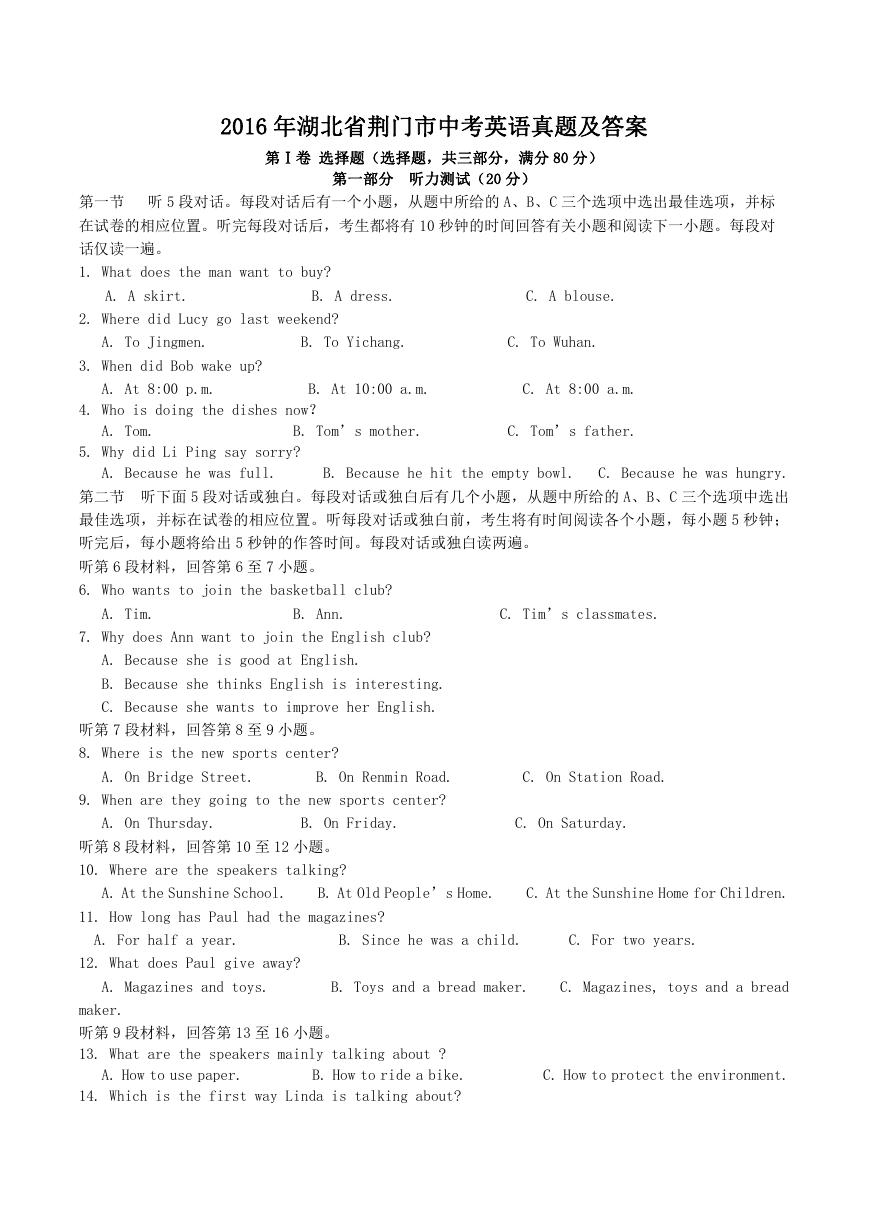

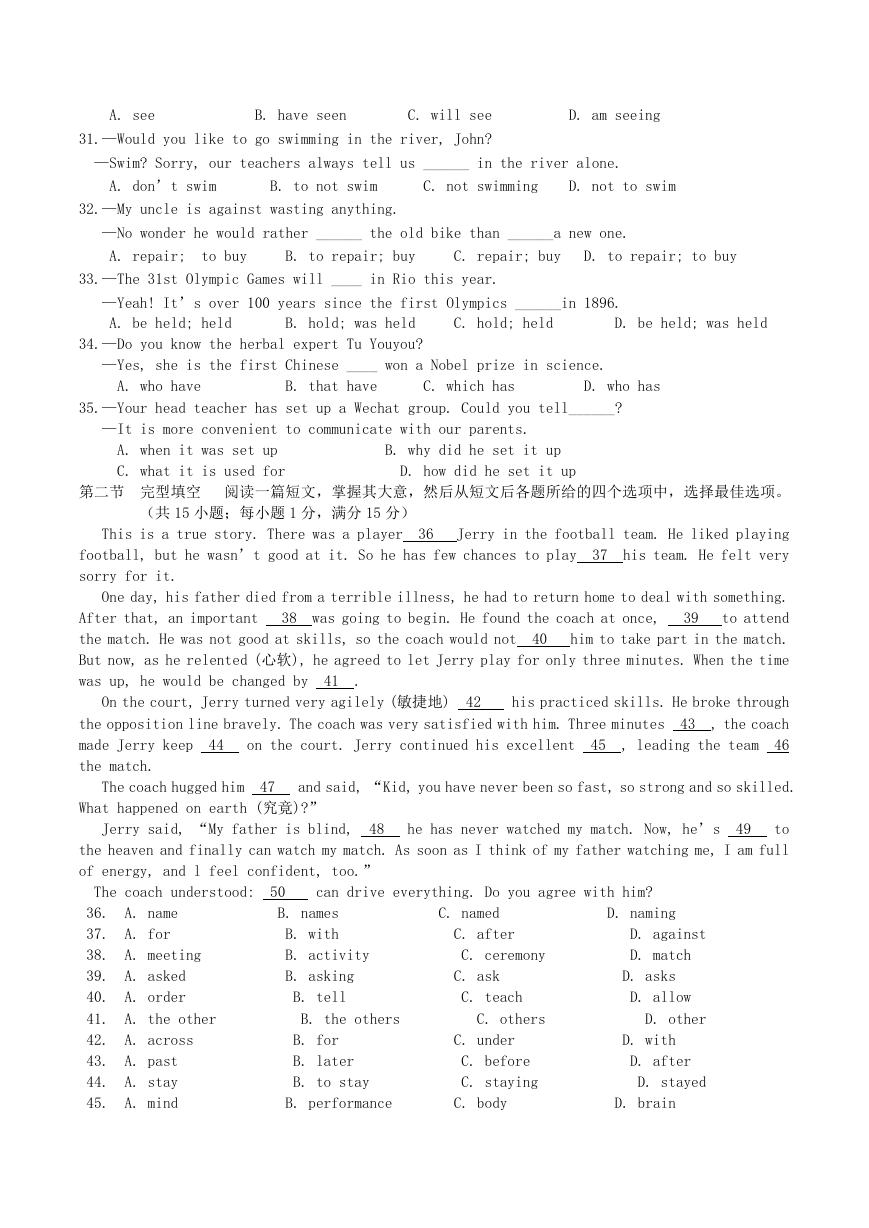
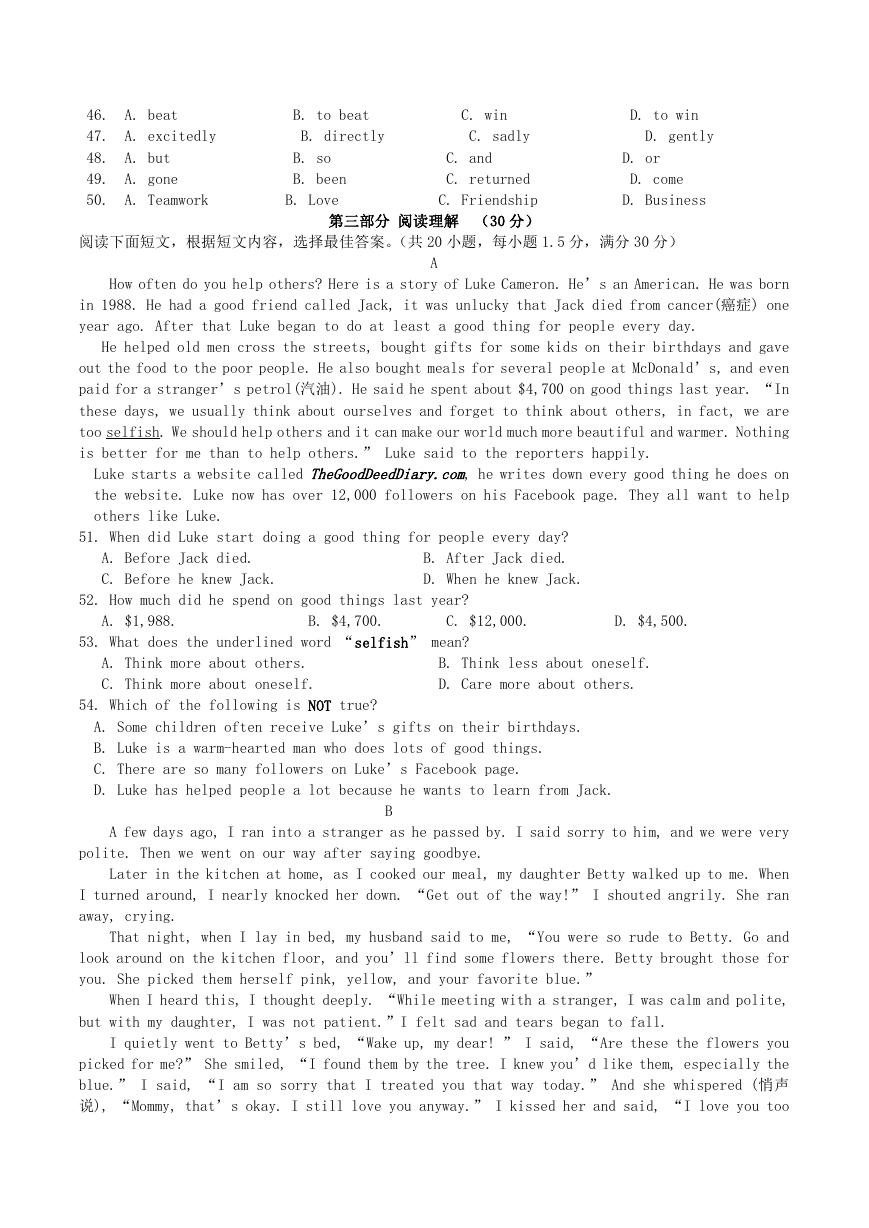
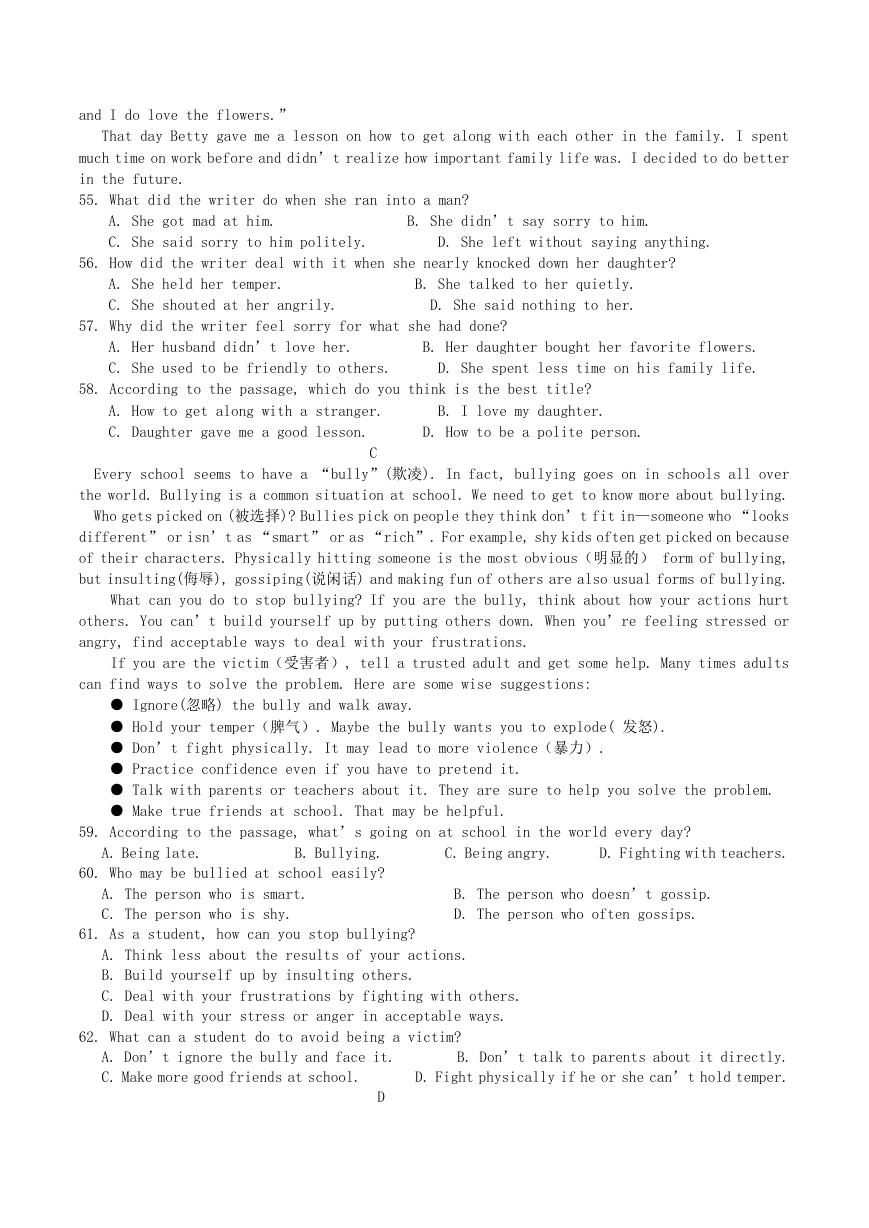
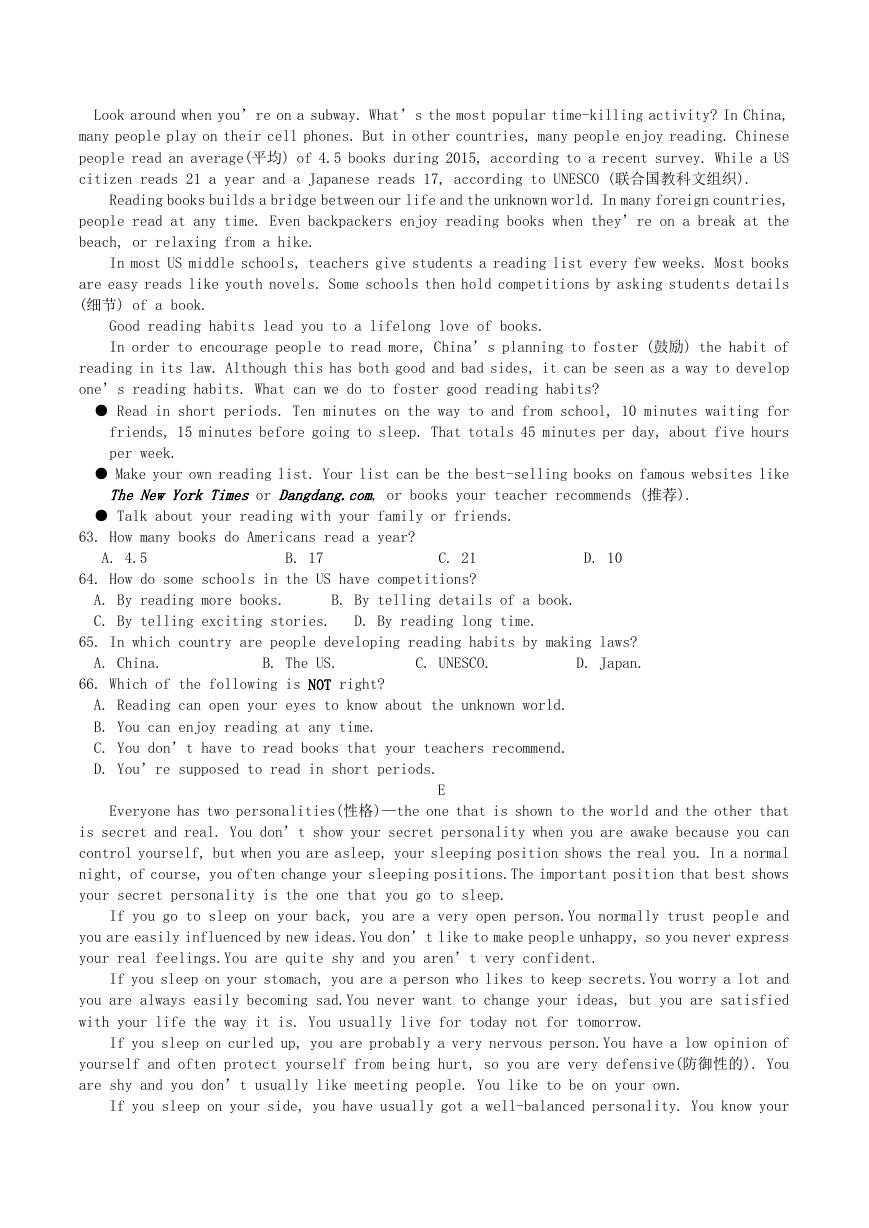
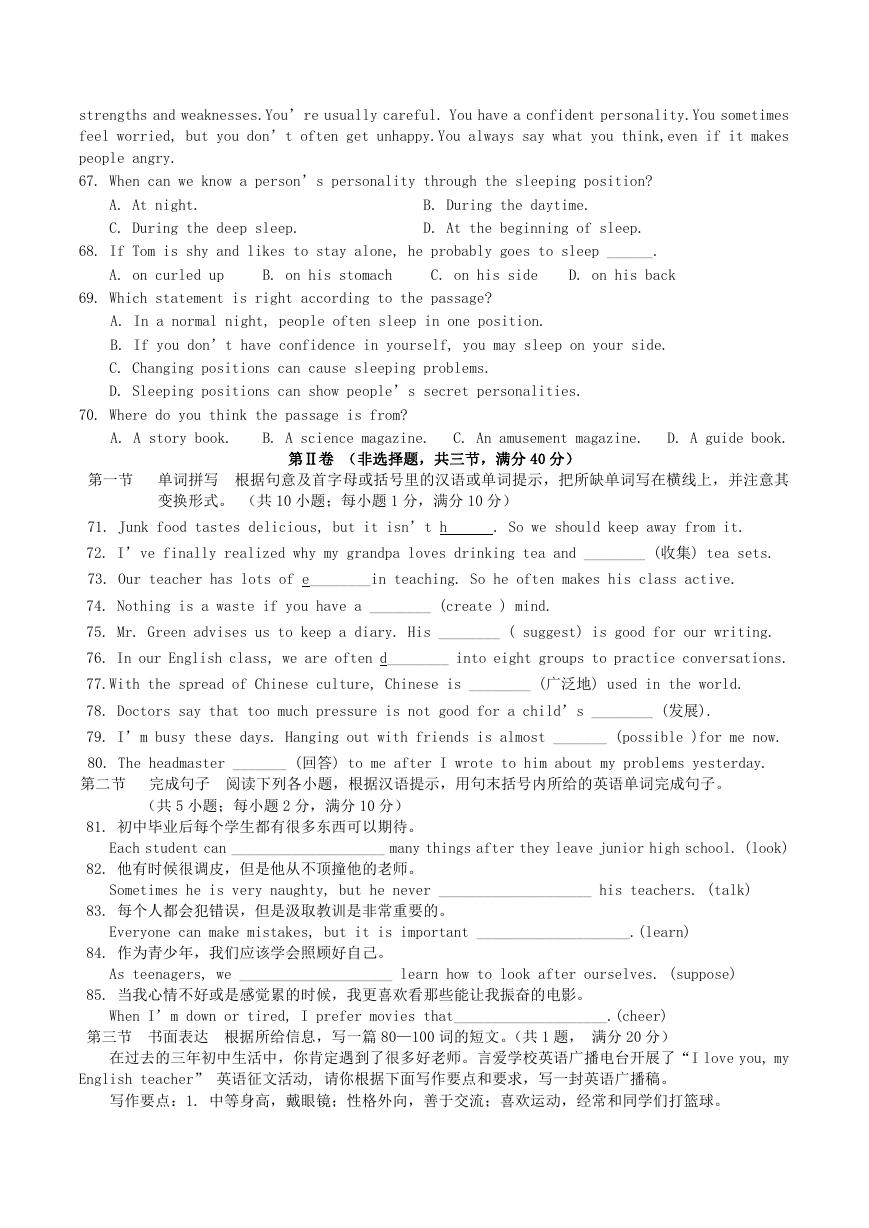
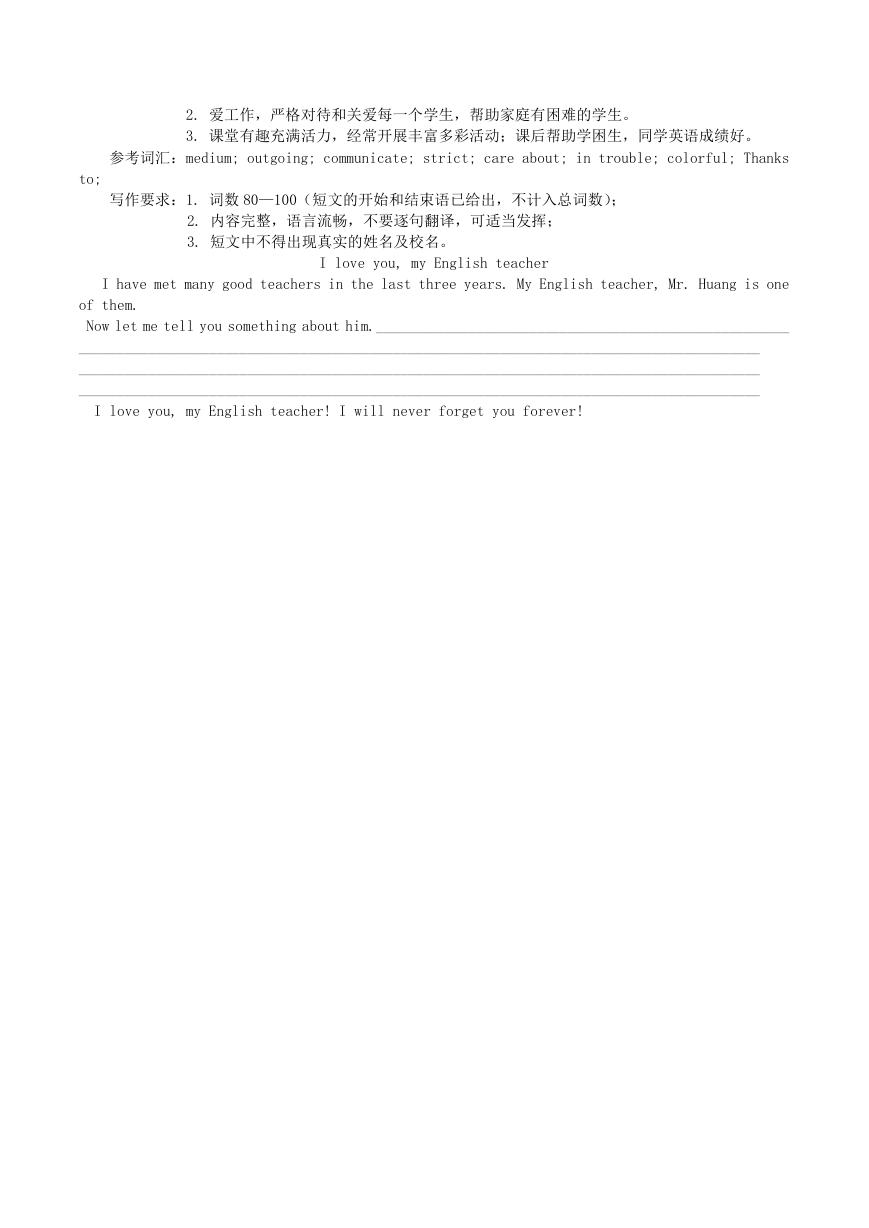








 2023年江西萍乡中考道德与法治真题及答案.doc
2023年江西萍乡中考道德与法治真题及答案.doc 2012年重庆南川中考生物真题及答案.doc
2012年重庆南川中考生物真题及答案.doc 2013年江西师范大学地理学综合及文艺理论基础考研真题.doc
2013年江西师范大学地理学综合及文艺理论基础考研真题.doc 2020年四川甘孜小升初语文真题及答案I卷.doc
2020年四川甘孜小升初语文真题及答案I卷.doc 2020年注册岩土工程师专业基础考试真题及答案.doc
2020年注册岩土工程师专业基础考试真题及答案.doc 2023-2024学年福建省厦门市九年级上学期数学月考试题及答案.doc
2023-2024学年福建省厦门市九年级上学期数学月考试题及答案.doc 2021-2022学年辽宁省沈阳市大东区九年级上学期语文期末试题及答案.doc
2021-2022学年辽宁省沈阳市大东区九年级上学期语文期末试题及答案.doc 2022-2023学年北京东城区初三第一学期物理期末试卷及答案.doc
2022-2023学年北京东城区初三第一学期物理期末试卷及答案.doc 2018上半年江西教师资格初中地理学科知识与教学能力真题及答案.doc
2018上半年江西教师资格初中地理学科知识与教学能力真题及答案.doc 2012年河北国家公务员申论考试真题及答案-省级.doc
2012年河北国家公务员申论考试真题及答案-省级.doc 2020-2021学年江苏省扬州市江都区邵樊片九年级上学期数学第一次质量检测试题及答案.doc
2020-2021学年江苏省扬州市江都区邵樊片九年级上学期数学第一次质量检测试题及答案.doc 2022下半年黑龙江教师资格证中学综合素质真题及答案.doc
2022下半年黑龙江教师资格证中学综合素质真题及答案.doc